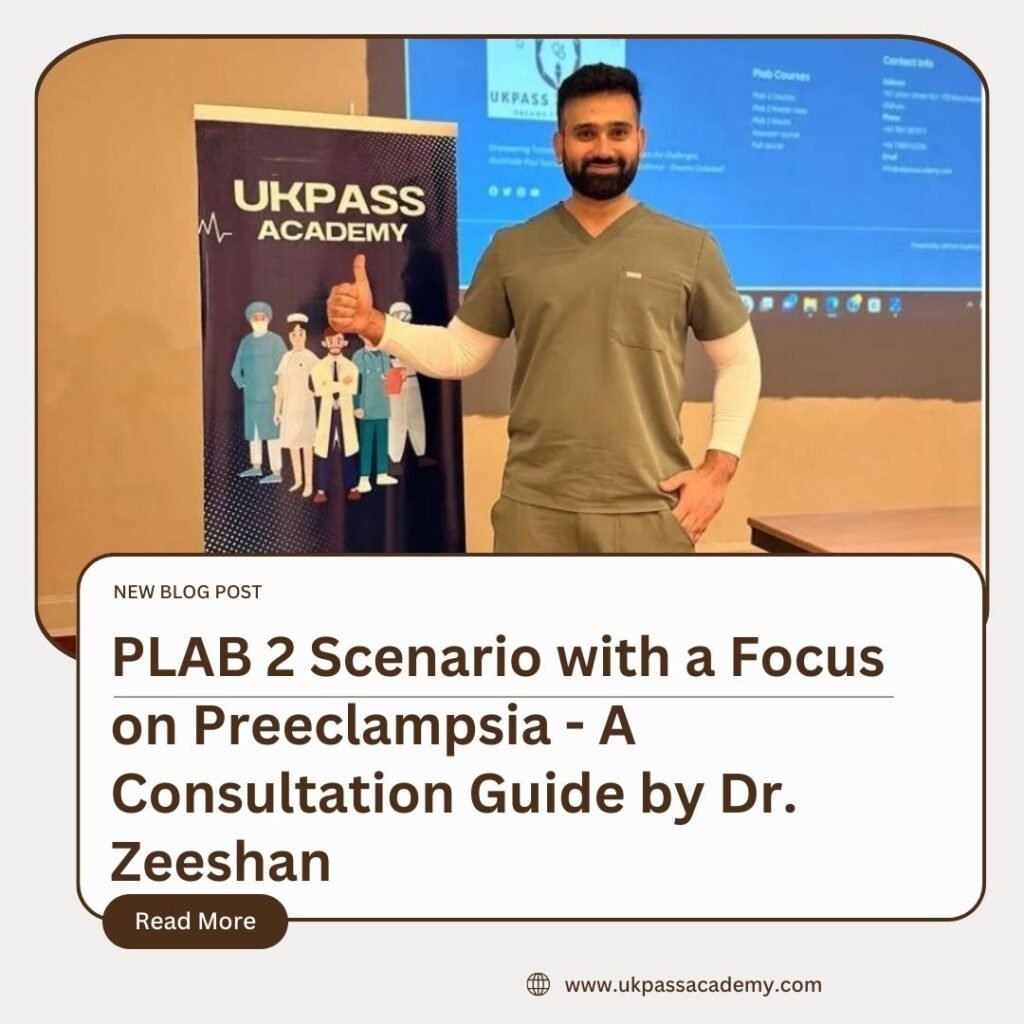Understanding Preeclampsia: A Case Study
Hello, everyone! I’m Dr. Zeeshan, and today we’re diving into a detailed analysis of a consultation involving a pregnant patient, XYZ, presenting with concerns about high blood pressure and protein in her urine. Let’s break down the key elements of this interaction to understand how we approach such scenarios in our PLAB 2 Course.
The Consultation Breakdown
Dr. Zeeshan begins by methodically gathering data from XYZ, ensuring a structured approach:
- Patient History: Dr. Zeeshan starts with XYZ’s background, confirming it’s her first pregnancy at 36 weeks.
- Symptom Evaluation: He explores symptoms such as occasional headaches and blurry vision, crucial indicators for potential conditions like preeclampsia.
- Medical and Medication History: Detailed questions ensure comprehensive understanding without missing any crucial details.
- Personal Lifestyle: Sensitively handled queries about smoking, alcohol consumption, and allergies.
Diagnosis and Management Discussion
Upon reviewing symptoms and test results, Dr. Zeeshan discusses the possibility of preeclampsia with XYZ, explaining the condition and outlining the next steps:
- Diagnostic Tests: Proposing blood tests, urine analysis, and fetal monitoring (CTG) to assess both XYZ’s health and the baby’s well-being.
- Treatment Plan: Introducing medication like labetalol for blood pressure control and magnesium sulfate if necessary to prevent complications.
- Birth Plan: Addressing XYZ”s desire for a water birth with empathy while emphasizing safety considerations.
Feedback and Learning Points
Dr. Zeeshan reflects on the consultation, evaluating his performance across three critical domains assessed in PLAB 2:
Data Gathering:
- Strengths: Structured history-taking, addressing specific symptoms, and thorough examination.
- Areas for Improvement: Need for comprehensive psychosocial assessment and inclusion of all relevant physical examinations.
Interpersonal Skills:
- Strengths: Establishing rapport and maintaining a conversational tone.
- Areas for Improvement: Handling sensitive questions with more empathy and avoiding laughter or dismissiveness in response to patient queries.
Management:
- Strengths: Following guidelines with a stepwise approach to treatment.
- Areas for Improvement: Providing more patient education, such as offering informational leaflets on preeclampsia.
Detailed Exploration of Preeclampsia
Let’s delve deeper into preeclampsia, a condition that affects pregnant women after 20 weeks and is characterized by high blood pressure and protein in the urine. Here’s how we tackle it in our PLAB 2 Course:
Understanding Preeclampsia
Preeclampsia poses significant risks to both mother and baby if left untreated. It can progress rapidly, leading to complications such as seizures (eclampsia), organ damage, and fetal growth restriction. In our course, we emphasize:
- Pathophysiology: Explaining the placental role and vascular changes contributing to hypertension and organ dysfunction.
- Clinical Manifestations: Detailing symptoms like headaches, visual disturbances, and edema that aid in timely diagnosis.
- Diagnostic Approach: Teaching the use of blood pressure monitoring, urine analysis for proteinuria, and other laboratory tests to confirm the diagnosis.
- Management Strategies: Covering pharmacological interventions, antenatal surveillance, and potential delivery planning based on disease severity and gestational age.
Practical Skills Development
At UKPASS Academy, we focus not only on theoretical knowledge but also on honing practical skills essential for PLAB 2 success:
- Simulation Sessions: Offering hands-on experience with simulated scenarios similar to XYZ’s case, ensuring readiness for real-world consultations.
- Mock Examinations: Conducting mock PLAB 2 exams to simulate exam conditions and refine examination techniques and time management.
- Interactive Learning: Engaging students with interactive workshops and case discussions led by experienced clinicians to deepen understanding and application of clinical guidelines.
Enhancing Interpersonal Skills
Effective patient communication and empathy are paramount in clinical practice. Our course emphasizes:
- Patient-Centered Care: Teaching techniques to build rapport, actively listen, and address patient concerns with empathy and professionalism.
- Cultural Sensitivity: Promoting awareness of cultural differences and their impact on healthcare decision-making and communication.
- Ethical Considerations: Discussing ethical dilemmas in obstetric care and guiding students on navigating these challenges while maintaining patient trust and confidentiality.
Supporting Your PLAB 2 Journey
We understand the challenges aspiring doctors face in preparing for the PLAB 2 exam. That’s why at UKPASS Academy, we offer comprehensive support:
- Expert Faculty: Access to knowledgeable instructors and mentors who provide personalized guidance and feedback throughout your preparation.
- Resource Library: Unlimited access to course materials, e-books, model consultation videos, and recorded crash classes to supplement learning.
- Career Guidance: Offering insights into career pathways, residency programs, and continuous professional development opportunities post-exam.
Conclusion
XYZ’s case illustrates the complexity and importance of thorough patient assessment and management in obstetric practice. By mastering the skills and knowledge covered in our PLAB 2 Course, you’ll be equipped to handle diverse clinical scenarios confidently and competently.
Join us at UKPASS Academy to embark on your journey toward PLAB 2 success. Our upcoming sessions are designed to prepare you comprehensively, ensuring you’re ready to excel in your exam and beyond. Contact us today to enroll and take the next step in your medical career!

